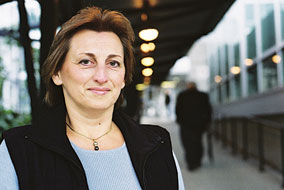
Prof. Judith Daniluk - photo by Martin Dee UBC Reports | Vol. 53 | No. 1 | Jan. 4, 2007
Grappling with the Moral Dimensions of Advances in Assisted Reproduction
By Prof. Judith Daniluk
Dept. of Education and Counselling Psychology and Special Education, Faculty of Education
Almost two years have passed since a single Romanian woman in her mid-60s gave birth to a daughter conceived through the use of donated eggs and sperm and in vitro fertilization (IVF). Worldwide, there was great concern about the ethical and moral implications of such technologies being used to assist a woman in her 60s, much less a single woman, to become a mother, given her life expectancy and the probability that she would not live to see her daughter reach adulthood. Concerns were also raised about future identity issues and the child’s entitlement to information about her medical and social history, given that she has no genetic relationship to her mother.
A similar outcry was heard again only a few months ago when a 63-year-old mental health professional gave birth in Great Britain to a child conceived through IVF using donated eggs and her husband’s sperm. In this case, the child is genetically related to one parent, and with two parents, there is a greater likelihood that at least one if not both parents will be around to raise her. But the issue of maternal age -- how old is too old? -- is still one with which we must grapple.
No doubt, this question will become even more salient as more women elect to preserve their fertility for years, or perhaps decades, by having their eggs cryopreserved -- a process where cells or whole tissues are preserved by rapidly cooling to low sub-zero temperatures.
The field of assisted reproductive technology (ART) is arguably one of the most exciting, progressive, and challenging areas of clinical practice. In the 28 years since the first successful birth of a child, Louise Brown, through the use of embryos created outside the womb -- we have witnessed tremendous advances in the treatment of fertility-related problems.
The treatment of male factor infertility has been revolutionized through a procedure known as intracytoplasmic sperm injection (ICSI), which allows a woman’s eggs to be fertilized in a laboratory using sperm produced by, or extracted from, the testicles of her infertile partner.
Couples who are concerned about passing on to their children serious genetically inherited diseases or chromosomal abnormalities can have their embryos screened prior to being returned to the woman’s womb, using a procedure known as pre-implantation genetic diagnosis. And more recently, thanks to recent scientific advancements, women facing cancer treatments, or desiring to preserve their fertility until a time in the future when they are ready to have children, can have their eggs or ovarian tissue cryopreserved.
As a consequence of these advancements, thousands of individuals and couples have had their dreams of becoming parents and having healthy children realized. And overall, the research suggests that other than the complications inherent in multiple births -- which occur more frequently when using ARTs -- the children born through these technologies are not at a significantly greater risk of having health problems or developmental difficulties than those conceived without intervention.
However, these advancements bring with them a number of challenging moral, ethical and social issues with which individuals and couples using these treatments must contend. What should be done with the remaining frozen embryos when treatment has been successful and couples feel that their family is complete, or when they are opposed to having these embryos destroyed but do not feel they can afford to raise more children, or when one member of the couple dies and the other wishes to use the remaining embryos?
Should a woman be allowed to use the cryopreserved sperm of her deceased husband, following his unsuccessful cancer treatments, in an effort to fulfill their dreams of having a child? Should couples be able to use pre-implantation genetic diagnosis, not for health reasons, but rather to determine the sex of their child?
Should young, childless women be allowed to donate their eggs to a friend, acquaintance or family member whose fertility is compromised because of advanced age? What if the recipient is her mother, her aunt or her mother’s best friend? Should egg freezing be available to healthy women who want to preserve their fertility until they are ready to have children, and if so, should there be a cap on the age by which these eggs must be used? What are the rights of children created with donated eggs or sperm to information about their medical and social histories?
In Canada, some of these questions may be addressed with the implementation of the Assisted Human Reproduction Act, which emphasizes informed consent and decision-making, and ultimately, the health and well-being of children conceived through these technologies. Others will be clarified by the practice guidelines of the Canadian Fertility and Andrology Society, whose 400 members comprise health professionals in the assisted reproductive health field.
As those of us in the social sciences conduct more research on the long-term implications and consequences of these technologies and new family forms, our findings will also help to provide necessary information upon which policies can be based and decisions can be informed. In the meantime, however, it is incumbent on mental health professionals like myself to assist individuals and couples in making the choices that are best for them and their potential offspring.
|
